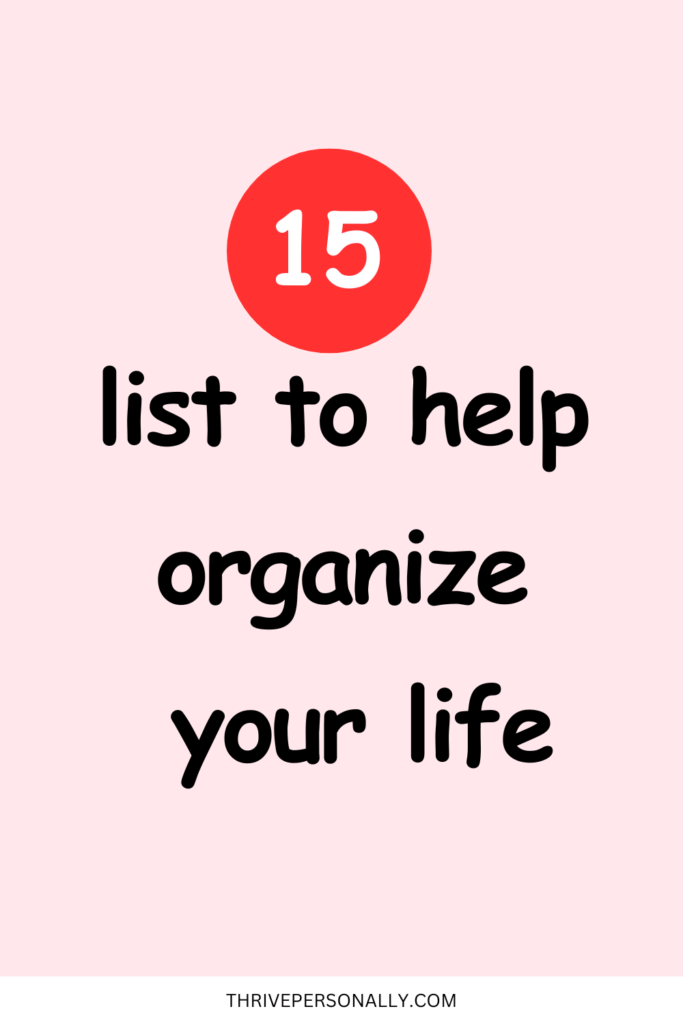The lifestyle you live each day shapes your future. One of the strongest foundations you can build is to be organized. If you’ve ever felt like you’re moving through life without direction, take heart—everything can be changed. You can take control of your time, your environment, and your priorities, shifting from living reactively to living deliberately.
15 Lists to Help Organize Your Life
1. Start With a Day Schedule
Your morning often sets the tone for the rest of the day. Without a plan, you may waste time on small, unimportant things. A clear morning routine gives you momentum as soon as you wake up. Include activities that wake your body, focus your mind, and prepare you for the day’s tasks—like stretching, reviewing your to-do list, or having a balanced breakfast. The key is to repeat healthy habits until they become second nature.
Read also: 10 Effective Ways to Self Discipline Yourself
2. Make a Daily To-Do List
A simple daily to-do list can give your mind a clear roadmap. Without it, you risk forgetting important tasks or bouncing between activities without finishing them. Keep your list realistic and mark your priorities. Start with the most important task so you complete something meaningful before your energy runs low.
3. Clean Up Your Home Space
Your environment strongly affects your mind. A messy home or workspace can leave your thoughts cluttered. Decluttering doesn’t mean throwing everything away—it means keeping only what you use and need. A tidy space saves time, reduces anxiety, and helps you avoid unnecessary distractions. In fact, research shows clutter can limit your brain’s ability to focus and process information (Princeton University).
Read also: How to Keep Your Room Clean and Tidy
4. Plan Your Week in Advance
Whether it’s Sunday night or another evening that works for you, take time to plan your week ahead. Note your top priorities and assign them to specific days. This reduces stress, gives you something to look forward to, and helps maintain balance between work, rest, and personal time.
5. Use a Simple System for Appointments
A calendar isn’t just for birthdays—it’s your tool to keep track of appointments, deadlines, and events. This prevents last-minute surprises. You can use a physical planner or a digital one—the important thing is to check it daily so you know what’s ahead.
Read also: 20 Rules That Will Make You Dangerous
6. Identify Your Core Priorities
It’s hard to organize your life without knowing what matters most to you. Take time to decide on your top priorities, whether they’re health, career, relationships, or personal growth. Once you know them, it’s easier to say no to distractions and focus on what moves you closer to your goals.
7. Create Routines for Small Tasks
Even small daily tasks like paying bills or grocery shopping can drain mental energy if they’re unplanned. Assign these tasks to specific days or times—such as paying bills every Friday or planning meals on Sunday. Routine makes them less stressful and more efficient.
8. Declutter Your Digital Space
Physical clutter isn’t the only problem—digital clutter can be just as overwhelming. Too many apps, emails, or disorganized files can slow you down and increase stress (APA). Delete unused apps, organize files into folders, and unsubscribe from unwanted emails. A clean digital space makes information easier to find and reduces mental fatigue.
9. Prepare for Rest Each Night
The way you end your day can set you up for the next one. A good bedtime routine helps you unwind, reflect, and rest properly so you can wake up refreshed. This might include reviewing your day, journaling, or setting out clothes for the next morning. Consistent bedtime habits support your natural rhythms and boost productivity.
10. Break Big Goals Into Smaller Steps
Big goals can feel overwhelming if you try to tackle them all at once. Break them down into small, achievable steps and track your progress. Even tiny actions move you forward, and seeing progress keeps you motivated.
11. Take Control of Your Finances
Money issues are a common source of stress, but a budget can bring security and peace of mind (NEFE). Track your income and expenses so you know where your money is going. Decide how much to save, how much to spend, and what to cut back on.
12. Maintain Your Physical Health
Your physical health directly affects your ability to stay organized. Eat balanced meals, exercise regularly, and get enough sleep. Good health gives you the energy and focus to tackle your daily tasks and long-term goals.
13. Learn to Say No
If you say yes to everything, you’ll quickly overwhelm yourself. Taking on too much wastes your time and energy. Learn to say no to things that don’t align with your priorities. It’s not selfish—it’s protecting your time for what truly matters.
14. Review and Adjust Your Plans
Life changes quickly, and so do your needs. Once a month, review your goals, habits, and routines. Ask yourself what’s working, what’s not, and what needs adjusting. Reflection—whether through journaling or quiet thought—keeps you from getting stuck in habits that no longer serve you.
15. Keep Your Mind Clear
Mental organization matters as much as physical organization. Journaling, meditation, and quiet reflection can help you process your thoughts and make decisions. With a clear mind, it’s easier to focus on what’s truly important.
Final Thoughts
Organizing your life is an ongoing process. Every day, you make choices that shape your path. The more you simplify, plan, and stay aware of where you’re headed, the more control you have over your time and your future. Take it step by step, stay consistent, and see how much better life becomes when it’s organized.
Save the pin for later



